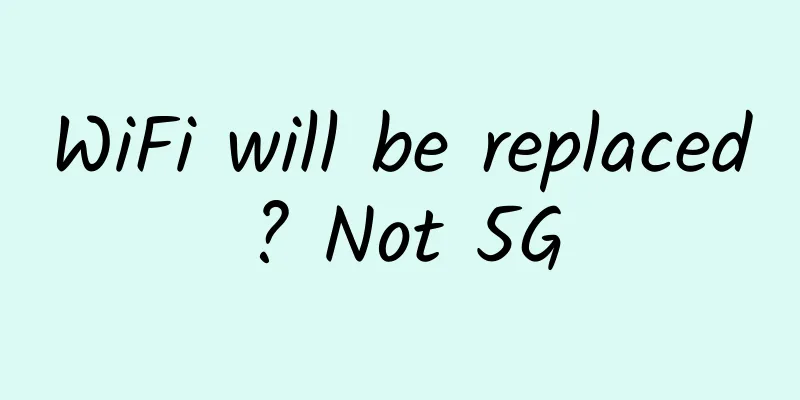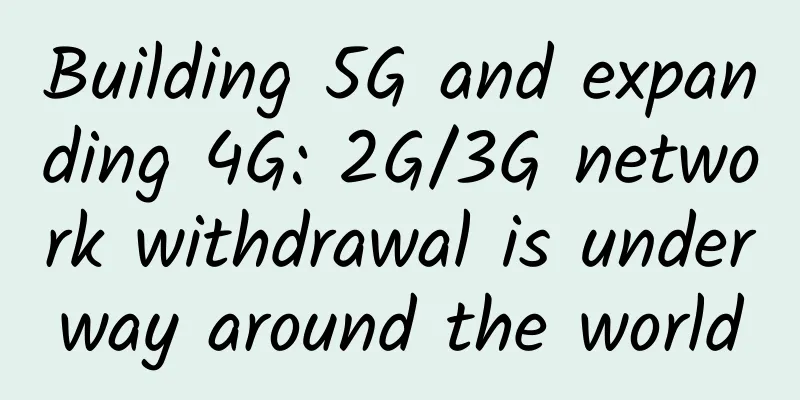WiFi will be replaced? Not 5G

|
The pace of life of modern people is getting faster and faster, and we need to handle various things more conveniently and quickly in our lives. With the development of 4G, it has met the Internet needs of most people. However, even so, when many people go to unfamiliar places, the first thing they ask is: What is the WiFi password? Even though our current 4G speeds have met our needs for surfing the Internet and watching videos, data charges are still high. In addition, WiFi is more stable and its speed is faster than the current 4G most of the time. Therefore, WiFi is still a necessity at present. Is WiFi going to be eliminated from the market? However, there are recent rumors that WiFi is about to be phased out of the market. This tool, which has become a necessity in our lives, is about to disappear, just like suddenly hearing that our mobile phones are about to leave us. Many people have equated the current WiFi with water and electricity. Not having WiFi is equivalent to having water and electricity cut off, which are the three major tortures of modern people.
According to foreign media reports, as all major operators in the United States have launched unlimited data plans, consumers no longer need to log in to WiFi networks to avoid expensive fees. This major change may cause WiFi to exit the stage of history, and the emergence of some competitive new technologies makes WiFi look dim and irrelevant. With the advent of the next generation of communication networks, the three major operators including China Mobile have finalized the 5G roadmap and have roughly planned the time for 5G commercial use. The rumors that WiFi is about to withdraw from the market are not so alarmist, but true. 5G has a higher speed, even reaching the speed of gigabit fiber. In addition, in the 5G era, the cost of data traffic will inevitably drop significantly, which can be seen from the change from 2G to 4G in China. And because it is mobile communication, it is not restricted by space, and you can access the Internet at high speed anytime and anywhere. In addition, now all major network operators have begun to release their own data packages, and the prices are cheaper than those of the three major operators. I believe that when 5G comes, truly cheap and easy-to-use 5G network packages will also be released. By then, it may really be able to replace WiFi, allowing us to use a faster and more stable network than WiFi. Is LiFi a replacement for WiFi? Of course, the disappearance of WiFi is not necessarily just due to the arrival of 5G. With the rise of other technologies on the market, the situation of WiFi will become more and more embarrassing. For example, the visible light wireless communication (LiFi) that was very popular some time ago is a strong challenger to WiFi.
Visible light wireless communication, also known as "light-guaranteed technology", is a new wireless transmission technology that uses the visible light spectrum (such as the light emitted by a light bulb) for data transmission. It was invented by Professor Harald Hass, Chairman of the Department of Mobile Communications at the School of Electronic Communications at the University of Edinburgh, UK, and a German physicist. LiFi mainly uses existing equipment and implants a tiny chip in a light bulb to form a device similar to an AP (WiFi hotspot), so that the terminal can access the network at any time. Wireless communication is achieved using visible light, that is, using electrical signals to control the high-speed flashing signals emitted by light-emitting diodes (LEDs) that are invisible to the naked eye to transmit information. In addition to being faster, LiFi is also extremely safe, because visible light can only travel in a straight line, so only people in the straight line of light can intercept information. However, there are pros and cons. Although LiFi is not affected by radio signals due to its own characteristics and can maintain high-speed transmission, visible light cannot penetrate walls, which limits the application of LiFi. WiFi is unshakable for now Although LiFi has good system security, if a telephoto lens is used with an adjusted optical sensor, optical signals can still be intercepted, so the so-called security is also somewhat intriguing. Therefore, LiFi will not replace WiFi for the time being, but at most it will be a supplement.
In the final analysis, the current position of WiFi is still unshakable. Most of the current smart devices that can be connected to the Internet are built based on WiFi. If you want to change to other connection methods, there is currently no very good alternative method, and if each smart device is equipped with a mobile network separately, the cost will be too expensive. Secondly, mobile network is also an important business for operators, and nowadays SMS services are basically notification-type information, and traffic charges have accounted for a large part of operators, so even if the tariff is reduced again, it will not be much lower. Therefore, it is basically difficult to enjoy a high-speed mobile network with no traffic restrictions at a very low price. summary Therefore, it is far from the time for WiFi to exit the market. Today, the total value of the entire WiFi industry has reached 20 billion US dollars. Such a large market will obviously not collapse easily. So what will replace WiFi? The answer will definitely not be 5G, but when a cheaper and more convenient network connection method than WiFi appears. |
<<: Distinguish between fat AP and thin AP, full WiFi signal coverage will be easy
>>: New trends: eight directions of development of the Internet of Things industry
Recommend
Why migrate to UCaaS? The reasons are many and obvious
[[395094]] Research shows that the future of ente...
Foxit Kunpeng OFD technology debuts at the 7th Military Expo to help the information construction of party, government and military documents
From July 5 to 7, 2021, the "9th China Comma...
5G applications are gaining attention, adding new impetus to smart education!
Education is a national priority. my country has ...
The UK invests £1 billion to build a full-fiber network, and 5G and ultra-fast broadband will soon benefit 2 million households
[[177138]] In the near future, 2 million househol...
The Ministry of Industry and Information Technology issued an urgent warning: fraud using "number portability" has been launched
On December 6, the Ministry of Industry and Infor...
WOT Huang Shuquan: Edge computing helps industrial intelligent manufacturing
[51CTO.com original article] On May 18-19, 2018, ...
OTDR YYDS, it is said that communications people can understand it!
Optical fiber is an important part of communicati...
New data momentum - Fanruan’s 4th Smart Data Conference concluded successfully!
From November 25th to 27th, Fanruan's 4th Sma...
Overview of Telecommunications Industry Development in 2017
The telecommunications industry is a hot field th...
Looking at 5G from a different perspective: Don’t talk about technology, talk about demand
[[280015]] 4G changes life, 5G changes society. W...
ServerGigabit: Malaysia VPS monthly payment starts from US$9.59, 100M unlimited traffic
I received two emails from ServerGigabit. The mer...
The three major operators work together to embrace 5G positioning, accelerate capacity improvement, and jointly create an industrial ecosystem
Telecom operators are not only the builders and o...
Understanding Lossless Networks in One Article
According to OpenAI's data analysis, the amou...
Ruijie SDN Open Network Platform ONP won the "2016 Most Innovative Award"
Recently, the results of the "China Enterpri...









